Etiqueta "SQL"
Se han encontrado 7 Coincidencias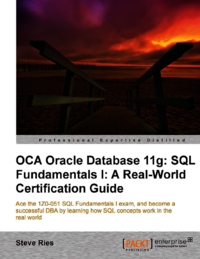
OCA Oracle Database 11g SQL Fundamentals I. A Real World Certification Guide
OCA Oracle Database 11g SQL Fundamentals I. A Real World Certification Guide
142 Visitas | 199 Descargas | 2013-09-26 18:58:19 | moliver
Successfully clear the first stepping stone towards attaining the Oracle Certified Associate Certification on Oracle Database 11g This book uses a real world example-driven approach that is easy to understand and makes engaging Complete coverage of the prescribed syllabus Learn from a range of self-test questions to fully equip you with the knowledge to pass this exam After reading this book, you can enter the exam room with confidence, knowing that you have done all you can to prepare for the big day
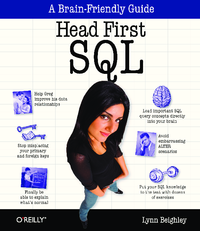
Head-First SQL
242 Visitas | 653 Descargas | 2013-10-03 16:20:26 | efirvida
Is your data dragging you down? Are your tables all tangled up? Well we've got the tools to teach you just how to wrangle your databases into submission. Using the latest research in neurobiology, cognitive science, and learning theory to craft a multi-sensory SQL learning experience, Head First SQL has a visually rich format designed for the way your brain works, not a text-heavy approach that puts you to sleep.

SQL Reference
SQL
173 Visitas | 201 Descargas | 2014-03-28 20:25:40 | josedanielr
This book is intended for anyone who wants to use the Structured Query Language (SQL) to access a database. It is primarily for programmers and database administrators, but it can also be used by general users using the command line processor. This book is a reference rather than a tutorial. It assumes that you will be writing application programs and therefore presents the full functions of the database manager.

SQL Pocket Guide
SQL
190 Visitas | 197 Descargas | 2014-03-28 20:28:35 | josedanielr
This book is an attempt to cram the most useful information about SQL into a pocket-size guide. It covers commonly used syntax for the following platforms: IBM DB2 Release 9.7, MySQL 5.1, Oracle Database 11g Release 2, PostgreSQL 9.0, and Microsoft SQL Server 2008 Release 2. Not all syntax will work on all platforms, and some features may not be available in earlier releases of these products. Whenever possible, I’ve tried to note any product or release dependencies.
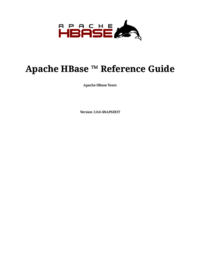
Apache HBase Reference Guide
Apache HBase
100 Visitas | 84 Descargas | 2015-11-10 20:19:12 | pecarrazana
This is the official reference guide for the HBase version it ships with. Herein you will find either the definitive documentation on an HBase topic as of its standing when the referenced HBase version shipped, or it will point to the location in Javadoc or JIRA where the pertinent information can be found.
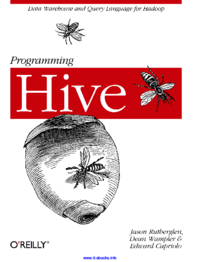
Programming Hive
Apache Hive
125 Visitas | 93 Descargas | 2015-11-13 20:56:41 | pecarrazana
However, a challenge remains; how do you move an existing data infrastructure to Hadoop, when that infrastructure is based on traditional relational databases and the Structured Query Language (SQL)? What about the large base of SQL users, both expert database designers and administrators, as well as casual users who use SQL to extract information from their data warehouses? This is where Hive comes in. Hive provides an SQL dialect, called Hive Query Lan- guage (abbreviated HiveQL or just HQL) for querying data stored in a Hadoop cluster. SQL knowledge is widespread for a reason; it’s an effective, reasonably intuitive model for organizing and using data. Mapping these familiar data operations to the low-level MapReduce Java API can be daunting, even for experienced Java developers. Hive does this dirty work for you, so you can focus on the query itself. Hive translates most queries to MapReduce jobs, thereby exploiting the scalability of Hadoop, while presenting a familiar SQL abstraction. If you don’t believe us, see “Java Versus Hive: The Word Count Algorithm” on page 10 later in this chapter.
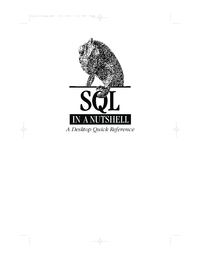
SQL In A Nutshell
SQL
136 Visitas | 121 Descargas | 2016-01-06 19:30:56 | adbenitez
The explosive growth of the information technology industry and the constantly growing need to compile, store, access, and manipulate increasingly larger masses of data have required the development of ever more sophisticated database management tools. Since its first incarnation in the 1970s, Structured Query Language (SQL) has been developed hand in hand with the information boom, and as a result, is the most widely used database manipulation language in business and industry. A number of different software companies and program developers, including those in the open source movement, have concurrently developed their own SQL dialects in response to specific needs. All the while, standards bodies have developed a growing list of common features. SQL in a Nutshellidentifies the differences between the various vendor implemen-tations of SQL. Readers will find a concise explanation of the Relational Database Management System (RDBMS) model, a clear-cut explanation of foundational RDBMS concepts, and thorough coverage of basic SQL syntax and commands. Most importantly, programmers and developers who useSQL in a Nutshell will find a concise guide both to the most popular commercial database packages on the market (Microsoft SQL Server and Oracle8i), and to two of the best known open source (http://www.opensource.org) database products (MySQL and PostgreSQL).SQL in a Nutshell’s attention to open source SQL products is an affir-mation of the growing importance of the open source movement within the computing community. As a result,SQL in a Nutshellbenefits several distinct groups of users: the knowl-edgeable programmer who requires a concise and handy reference tool, the developer who needs to migrate from one SQL dialect to another, and the user who comes to SQL from another programming language and wants to learn the basics of SQL programming.
Contribuir
Usted puede contribuir con Libros UCLV, es importante para nosotros su aporte..
Contribuir